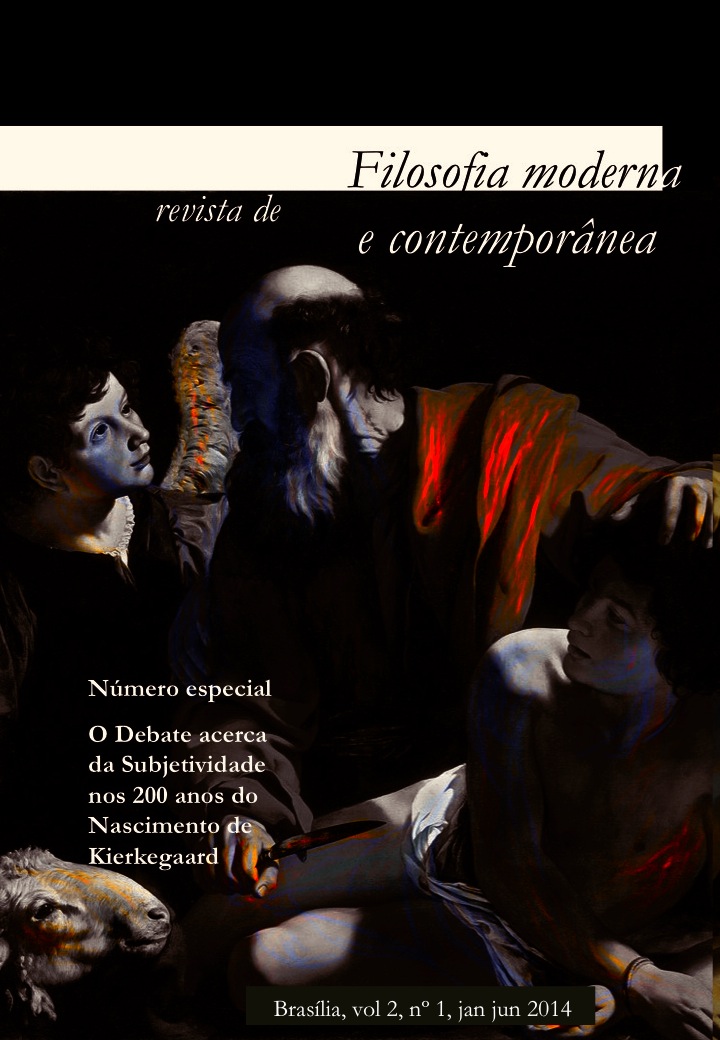Singularity and Universality in reading processes Kierkegaard
DOI:
https://doi.org/10.26512/rfmc.v2i1.12393Keywords:
Kierkegaard, Starobinski, Unity, Singularity, Universality, SubjectivityAbstract
It is common to find commentators of Kierkegaard’s oeuvre who try to overcome the diversity and heterogeneity inherent to the Danish philosopher’s production by applying procedures of reduction to unity, in particular by transforming Kierkegaard into an exclusively religious thinker. The example provided in the beginning of the present paper examines Jean Starobinski’s reading of the philosopher according to such a problematic approach. Subsequently the paper characterizes in detail the diversity and heterogeneity in Kierkegaard’s writing in order to provide an answer for this diversity and heterogeneity based on hermeneutic presuppositions, by putting forward a theory of the singularity and the universality of experience which might surpass the polarities drawn by a radical dichotomy between unity at all cost, on one side, and inoperative multiplicity, on the other. The last section of this paper exemplifies the applicability of the concepts of singularity and universality by means of a sequence of situations taken from Kierkegaard’s production. The conclusion re-instates the integration of both concepts within an understanding of the construction of the reader’s existential subjectivity.
Downloads
References
GARFF, J. “The Eyes of Argus ”“ The point of view and points of view with respect to Kierkegaard’s ‘Activity as an Author’”. In: Conway, D. (Ed.), Søren Kierkegaard ”“ Critical Assessments of Leading Philosophers, Volume I. London: Routledge, 2002, pp. 71-96.
JASPERS, K. “Kierkegaard hoy”. Trad. A. Sánchez Pascual. In: Sartre, J. P., Heidegger, M., Jaspers, K. et al., Kierkegaardvivo. Madrid: Alianza, 1970, pp. 63-72.
JUSTO, J. M. “Kierkegaard’s Writing andInfinitude. If We Are Finite, How Can We Relate or Refer to Infinitude?”. In: Justo, J. M., Sousa, E., M., Rosfort, R. (Eds.), Kierkegaard and the Challenges of Infinitude. Philosophy and Literature in Dialogue. Lisbon: CFUL, 2013, pp. 173-184.
JUSTO, J. M. “Kierkegaard: Unity or Singularity”. Rivista di Filosofia Neo-Scolastica, Milão, 3-4 (2013), pp. 897-912, 2013b.
KIERKEGAARD, S. Søren Kierkegaards Papirer. Org. P. A. Heiberg, V. Kuhr e E. Torsting. København: 1909-1948 (Abrev.: Pap. seguido da numeração do fragmento atribuída nessa edição.).
KIERKEGAARD, S. Søren Kierkegaards Skrifter. Org. Niels Jørgen Cappelørn, Joakim Garff et. al. København: Søren Kierkegaard Forskningscenteret, Gads Forlag, 1997-2013. (Abrev.: SKS, seguido do número do volume em romanos e da página em árabes.)
MACHEREY, P. Proust. Entre littérature et philosophie. Paris:Éditions Amsterdam, 2013.
PROUST, M. Le temps retrouvé: À la recherche du temps perdu, tome IV. Paris : Bibliothèque de la Pléiade, Gallimard, 1987-1989.
SCHÖNBAUMSFELD, G. A Confusion of the Spheres. Kierkegaard and Wittgenstein on Philosophy and Religion. Oxford, New York: Oxford University Press, 2007.
STAROBINSKI, J. L’Encre de la mélancolie. Paris: Seuil, 2012.
Downloads
Published
Issue
Section
License
Copyright for articles published in this journal is retained by the authors, with first publication rights granted to the journal. By virtue of their appearance in this open access journal, articles are free to use, with proper attribution, in educational and other non-commercial settings.


